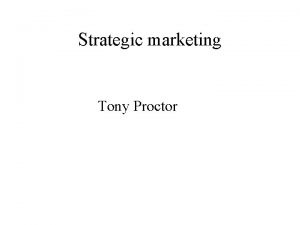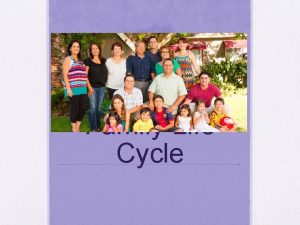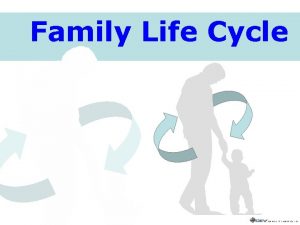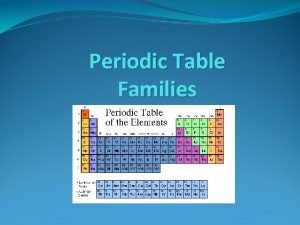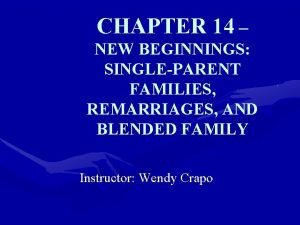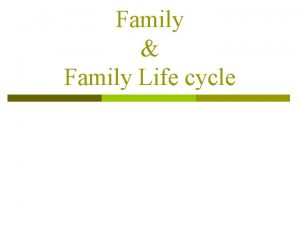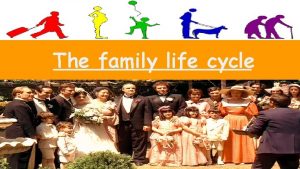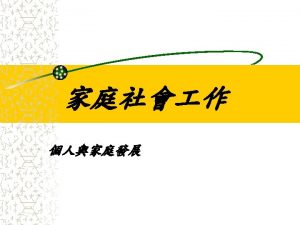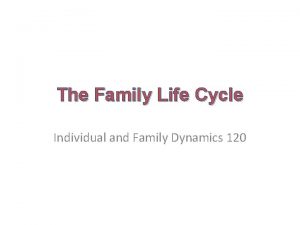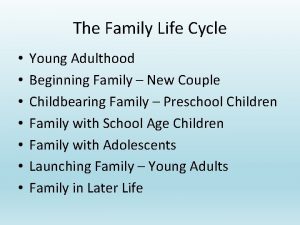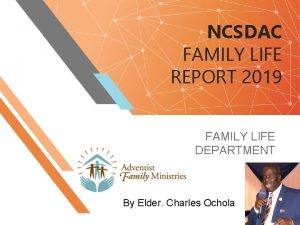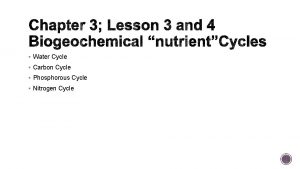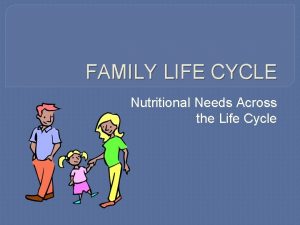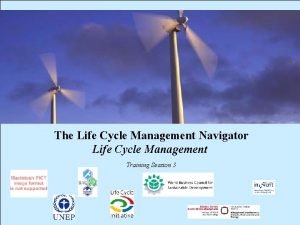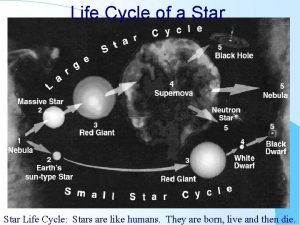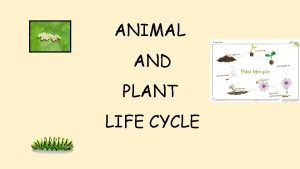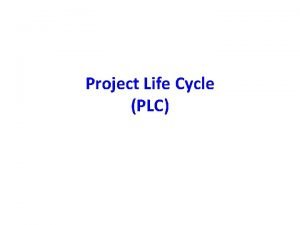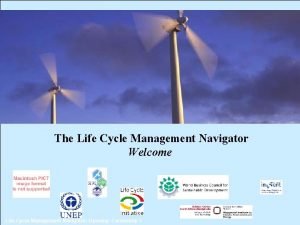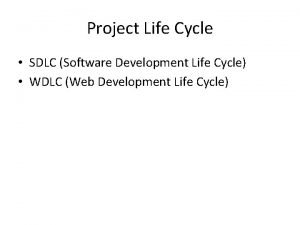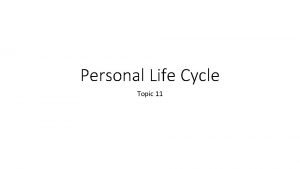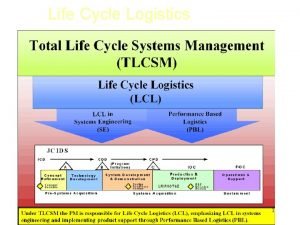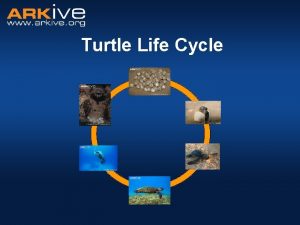Family Life Cycle What is the cycle The

























- Slides: 25

Family Life Cycle

What is the cycle? • The Family Life Cycle (FLC) is the EMOTIONAL and INTELLUCTUAL stages a person passes through from childhood to their retirement years as a member of a FAMILY. • There are FOUR stages within the cycle. • The stages are COUPLING, PARENTING, MIDDLE YEARS AND RETIREMENT.

Four Stages 1 Coupling 2 Parenting 1 2 3 Expanding Developing Launching 3 Middle Years 4 Retirement

Happenings in Stages…. . • In each stage, a person faces challenges in their family life. • From these challenges, a person typically develop skills to help them work through the challenges. • There are complications in each stage causing things to not go well. Examples would be severe illness, financial problems, death, etc.

Why is this important? • Developing new skills in times of challenges helps a person move on to the next stage of life with a healthy mindset. • When a person struggles in a stage and moves forward, there are unresolved issues waiting to be dealt with. • What would be some examples of unresolved issues a person may face?

How to be successful? • A person can learn the skills they miss in different stages of the cycle. This will improve your quality of life in any stage. • Self-examination, education, and counseling can assist a person in being successful. • Also, being realistic about different challenges and taking steps to deal with them. • What are some examples of challenges a family might have to face?

Coupling Stage • Coupling is the first stage. • Coupling is where a person develops a committed relationship with another person. • Long term commitment or marriage is usually the outcome

Coupling Reminders • During the coupling stage, a person is connecting and committing to another person, which is the development of a new family system. • With this connection, both people bring their own ideas, expectations, and values from their previous family experience. • This stage requires skills of sharing, reflecting, adapting, and reshaping.

Coupling • Couples are faced to redefine their thoughts about the following: • • Finances Lifestyle Recreational activities or hobbies Relationships with family Sexuality or sexual compatibility Friendships Putting another person's needs before your own.

Skills you build… During this stage, you and your partner build the following skills: • • • Advanced interpersonal communication. Problem-solving skills. Common spiritual and emotional development How to form boundaries in relationships. When to place the needs or importance of the other person above your own. • INTERDEPENDENCE

Interdependence • Interdependence is probably the MOST important skill you learn in this stage. • It is the ability that a person has to rely on another for support but also be able to do things independently.

Winning at Coupling • There will be bumps, but success is possible! • Establishing a healthy relationship with your partner puts you into a position of success when moving into the next stage of the FLC. • You learn importance of transition, commitment, and putting the needs of another ahead of your own. • Why are these important?

Parenting • Many times, couples decide that they want to start a FAMILY. This decision should be discussed during coupling. • When the decision is made to become parents, it is one that impacts • Individual development • Identity of a family • Couple’s relationship • Why do you think all these areas are impacted?

3 stages of Parenting • The Expanding Family • The Developing Family • Launching

Expanding Family • First part of parental stage when new members are added to the family • Alone time between couples drops drastically because time is focused on small children

Developing Family • Children move into school and focus shifts outside the home • Teens are getting ready to leave their family

Launching • End of parenting stage when children are leaving the family home • Sending children out on their own • Extended when adult children return home • 36% of young adults live in parent’s home

Launching • Starts when first child leaves for college and continues until all children are gone. • It is difficult for some parents to establish adult relationships with their children, which is KEY for future success. WHY? • Parents need to be accepting of new people that their children may bring into the family as well as new relationships their children establish with another family.

The Middle Years • Children are gone and parents become a “couple” again • Income pressures often decrease during this stage • Empty nest sometimes leaves parents feeling sad-others feel freedom and excited for new time to focus on each other • People start caring for aging parents

Retirement • Retirement is the last stage of the Family Life Cycle. The person is no longer solely responsible for their children. They can enjoy life and live life fully and happily. • This stage is about establishing NEW relationships (grandchildren or other new family members) as well as letting go of PAST relationships (death or divorce).

Retirement • Ideally, people in this stage are ending their career (by choice) and beginning a new path in their life that can be exciting. • Time is spent now on new interests

Sounds cool but…. . • Although retirement sounds like the good life, it can bring many challenges. • Some people struggle with balancing their family with their new life and find it more stressful. Why do you think this is? • Retired people may also have to care for an aging parent or an ailing spouse.

Other challenges • Retired people will also notice a decline in their health and physical and mental abilities, which can be frustrating. • Also, retired people experience financial changes as well as social changes. • It is also a time where death of a spouse, family, and friends occurs. Life is coming full circle.

Do not despair though… • Retirement is the last stage of the Family Life Cycle but not the “end” of a person’s existence. • It is a time where a person can share their wisdom and knowledge with their family, enjoy their family, and find a new life. • It is a time to be reflective and grateful for life.

Quick Review • Write down the 4 stages of the Family Life Cycle. • For each stage, give a KEY characteristic of each stage. • What stage are you most excited for and why?
 Family life cycle marketing
Family life cycle marketing Coupling stage family life cycle
Coupling stage family life cycle Family life cycle diagram
Family life cycle diagram Family life cycle stages
Family life cycle stages What is your personal definition of family
What is your personal definition of family Difference between nuclear family and joint family
Difference between nuclear family and joint family Varies from family to family on the periodic table.
Varies from family to family on the periodic table. Characteristics of single parent family
Characteristics of single parent family Hát kết hợp bộ gõ cơ thể
Hát kết hợp bộ gõ cơ thể Bổ thể
Bổ thể Tỉ lệ cơ thể trẻ em
Tỉ lệ cơ thể trẻ em Gấu đi như thế nào
Gấu đi như thế nào Chụp phim tư thế worms-breton
Chụp phim tư thế worms-breton Alleluia hat len nguoi oi
Alleluia hat len nguoi oi Môn thể thao bắt đầu bằng từ đua
Môn thể thao bắt đầu bằng từ đua Thế nào là hệ số cao nhất
Thế nào là hệ số cao nhất Các châu lục và đại dương trên thế giới
Các châu lục và đại dương trên thế giới Công thức tính thế năng
Công thức tính thế năng Trời xanh đây là của chúng ta thể thơ
Trời xanh đây là của chúng ta thể thơ Mật thư anh em như thể tay chân
Mật thư anh em như thể tay chân 101012 bằng
101012 bằng Phản ứng thế ankan
Phản ứng thế ankan Các châu lục và đại dương trên thế giới
Các châu lục và đại dương trên thế giới Thể thơ truyền thống
Thể thơ truyền thống Quá trình desamine hóa có thể tạo ra
Quá trình desamine hóa có thể tạo ra
